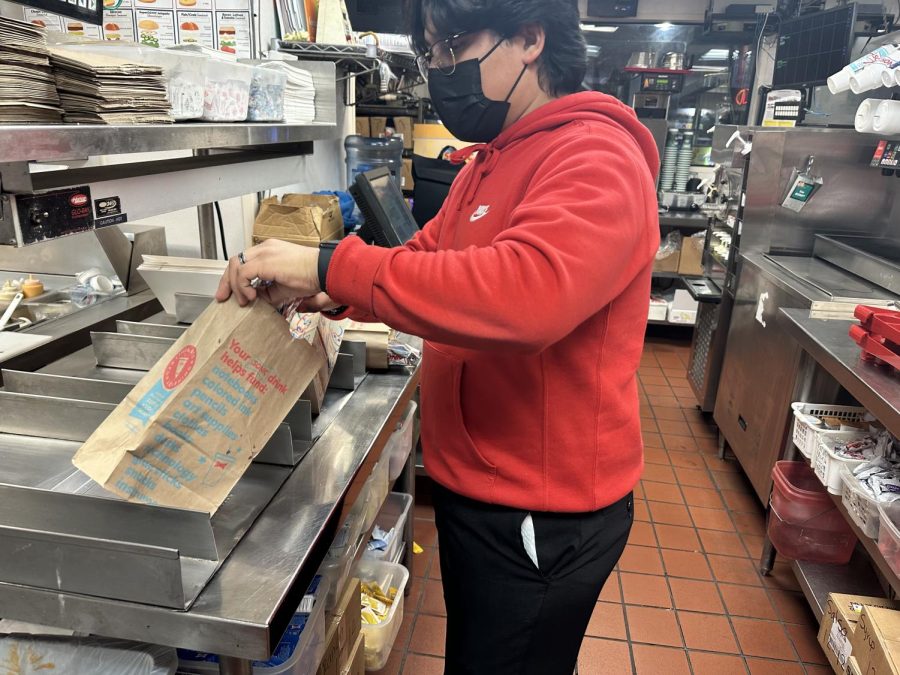Evelios Santos works his night shift on Wednesday, Dec. 14 where he has to prepare ingredients, cook food and pack it. He usually works 3-4 days a week after school along with his brother. (Photo provided by Alfredo Santos)
Flipping burgers and saving lives
Jan 10, 2023
They work long hours, sometimes shorter depending on school. Their conditions differ from each other’s, but the end result is the same: a paycheck in their hands. Brothers Alfredo Santos and Evelios Santos and juniors Roman Bernal and Sebastian Quinonez all know the challenges of working, but they also know the rewards. After working at their jobs for over a year, they share their reasons for working and their experiences with balancing that work with school.
Day and night: A work-school balance
It’s still dark outside when he wakes up and the only noise is his keys jingling, the door locking and the car starting.
After a 7-minute drive, he’s the first to arrive. But, he’s the last to leave. It’s not the best way to spend his Sunday, but he’s gotten used to it after a year.
Senior Evelio Santos works part-time at Sonic as an assistant manager. Part of that job means waking up as early as 5 a.m. or staying as late as midnight.
“Especially with school and work, you do not get enough sleep,” Evelios said. “It’s what is expected of me. As assistant manager, I make sure that everything is done correctly and that people do as they’re told. Being told that I was next to be an assistant manager was something that I was very much happy with because it was something I worked so hard for and wanted so much.”
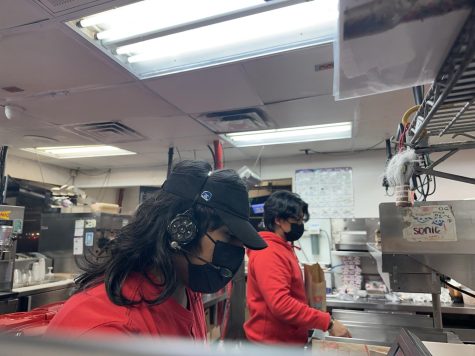
But, that was not his only aspiration. Evelios said that he also hopes to show his brother, junior Alfredo Santos, the benefits of being an assistant manager.
“It is also a responsibility of mine to be a better role model for my brother,” Evelios said. “I think Alfredo already knew about the advantages and how much he can learn from the job. I just might have pushed it a bit.”
According to Evelios, the most rewarding part of his job is the paycheck, and knowing that it is his hard work that earned the money made it all the more satisfying. But he found the responsibilities that came with the job just as valuable.
“It gave me an opportunity to be able to know what it means to be an adult,” Evelios said. “When it comes to having other duties to be taken care of at home, my money isn’t just for me; it’s also for my family: to take care of them and to help them. I chose to pick this job and it was because I wanted to help my family.”
Once he turned 16, Alfredo followed in his brother’s footsteps to work at Sonic and is now training to be an assistant manager too. Though Alfredo said he enjoys working weekend shifts with his brother, he also prefers working separate night shifts on weekdays from 5-11 p.m.
“I think we balance each other and we know what time to leave the house and get ready and everything else,” Alfredo said. “But, I also enjoy night shifts. It’s where my crew is at. All of them are hard workers. They do their job and get everything done. Some of them have already graduated, but there are three others who are students too.”
Despite what he’s personally gained from his job, Alfredo said his school life has been affected negatively by the long hours he’s had to put into it.
“I can’t do hard classes because I wouldn’t be able to do all the homework,” Alfredo said. “I’ve heard people say that the teachers give a lot more homework in U.S. History, so I didn’t pick that class. Then, there was also a time when my guitar teacher told me he was impressed by my playing and wanted me to come to an event. I couldn’t go since I had to go to work. It really bummed me out to miss that.”
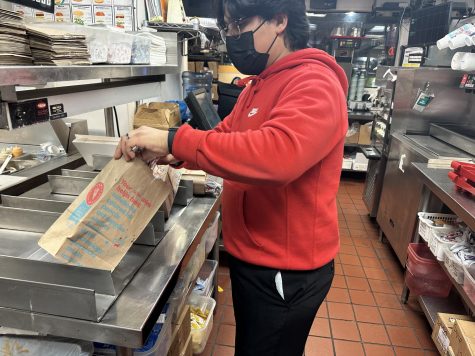
Both brothers emphasize achieving a balance between their school and work lives through effective time management. For Evelios, that means finishing his assignments during class time and lunch to free up time when he is at home.
“I’ve accommodated enough, especially with my time management, to be able to sustain doing two things at the same time: to have school and to have that work life,” Evelios said. “I would say some pressures are meeting the expectations that were put on me at work and at school, and particularly when it comes to my grades or when it comes to meeting the expectations of my parents as well.”
Alfredo emphasized that having an understanding employer who is more flexible with his work schedule also helps him maintain that work-school balance as well.
“I think my boss is pretty chill with me,” Alfredo said. “I feel comfortable telling him if something comes up and he’ll be like ‘that’s okay, you can have the day off.’ He understands that I’m a student as well and I have other responsibilities. That’s why he doesn’t keep me until midnight during the school year and makes sure to put me in for extra hours once summer comes.”
But, even with his schedule working for him, Alfredo said the work can get exhausting, especially when people, whether it be customers or his coworkers, complain. These workplace conflicts, though, have taught Alfredo how to calm others.
“You start learning how to treat people so that you can smooth your way with them,” Alfredo said. “You learn how to calm them down. I think it’s a useful skill to learn from working in fast food on my part.”
Despite the advantages gained and skills learned from working, Evelios counters that there are drawbacks, especially with having a social life.
“It’s not something you get very much of when you get a job,” Evelios said. “I’ve been invited to parties. I’ve been invited to hang out but sometimes my work schedule says I can’t so I had to turn it down.”
While at work, Evelios almost always encounters unfair treatment, but he said he just brushes it off and continues doing his job.
“On a regular basis, we will have issues with customers,” Evelios said. “Being an assistant manager you always have to deal with customers and always have to make sure they are treated correctly so that they want to come back. Usually, if you just continue on your normal day, then there shouldn’t be an issue with you being able to do the best you can at both school and at work.”
But, in the face of these setbacks, Evelios said he has learned to have patience, something that has helped both in the workplace and at school.
“You have to be patient with other people, especially if they’re new or if they’re still in training,” Evelios said. “Make sure to collect yourself and see where you are. I started off as an employee, but I built myself up to get to where I am now and I am grateful for that opportunity.”
Though he still strives to achieve that balance, Alfredo said anybody can do the same and that working as a student is just one more responsibility for him: nothing more, nothing less.
“It does get stressful, but not a lot,” Alfredo said. “I think anyone can control it. I think anyone’s able to do it. But I mean, again, everyone’s different, so others may not be able to do it. Who knows what’s going on with their own lives?”
Learning life skills through lifeguarding
A little girl thrashes her arms in the water as she struggles to stay afloat. Her head goes under. The teenage lifeguard dives into the pool, pulls her out of the water and saves her life.
Junior Sebastian Quinonez started lifeguarding four months ago, hoping to gain experience in the workforce and make some money on the side.
“I had to save two people’s lives,” Quinonez said. “The first one was on my very first day on the job. It was a pretty easy save because it was just a little girl drowning but it was so all of a sudden that I didn’t expect that and it caught me off guard. It freaked me out a little bit but I got the job done.
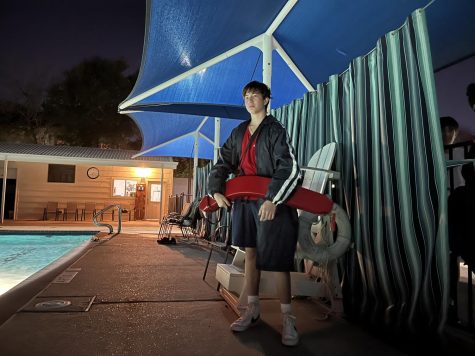
On his fourth shift as a lifeguard, he had to save yet another child. This time, it was an autistic kid who couldn’t swim properly. Quinonez stepped up to the plate and brought him to safety. He said he was more relaxed because he had done it before.
“I felt good about it because I knew that if I wasn’t there or if I wasn’t paying attention, they probably would have lost their life but since I saved their life, their parents are very, very thankful that I was there and watching them,” Quinonez said.
Quinonez first started lifeguarding to follow in the footsteps of his older sister who lifeguarded for three years in the same area before going off to college. The good pay, fun environment and the fact that it was a “really easy job” led him to pursue it.
The average day of being a lifeguard, according to Quinonez, begins with one of his parents driving him to the Bellaire Family Aquatics Center, where he primarily works. He starts his shift by getting the keys from the padlock, unlocking everything and getting everything ready for people to come.
“The best experience I’ve had was one day during the summer it was thundering so we were closed down,” Quinonez said. “We just started playing a bunch of board games like with each other – Jenga and stuff – and just talking and it was really fun.”
“Then we go to the office area where we just chill and wait for people to come,” Quinonez said. “Once somebody comes in and we just get out there, sit in their chair, watching them. We rotate in with whoever we’re working with. And then once that’s over, we close the place down, put the keys back where they belong.”
Junior Roman Bernal also had to save two lives at the Bellaire Pool during his employment as a lifeguard since July. He describes the feeling of being responsible for somebody’s life.
“When it does come down to it you’ll get a fight or flight feeling,” Bernal said. “Obviously you have to go for the fight because you know you can’t just run away from it. If you do, you can be sued for negligence and lose your job.”
Bernal had his most memorable experience as a lifeguard before he worked at the Bellaire Pool. He was lifeguarding at a small neighborhood pool when two toddlers started drowning during a party.
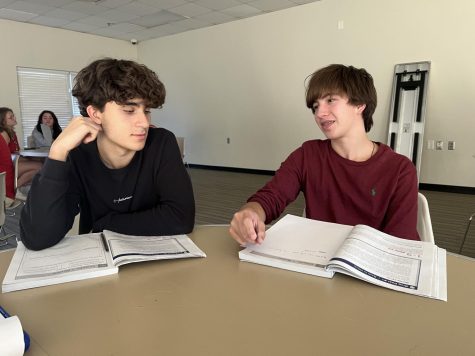
“I had to jump in and save one of them and I had to get the dad to help me hold the kid and make sure he was doing okay while I got the other one,” Bernal said. “They were both fine in the end. One of the kids was struggling and was really shaken and he didn’t want to go to the water for the rest of the day. The worst part of that was probably just seeing the kid’s face because I love the water, I like to swim and I like anything aquatic and seeing him being scared to do that was sad for me.”
Knowing that he is impacting the lives of others is what motivates Bernal to go to work every day.
“My biggest influence is my Scoutmaster,” Bernal said. “He works with the fire department and he is typically the first person to enter a burning house and locate people. He says that every time is like a different experience and he’s still scared to do it. It’s an incredible thing to do and I just want to experience that myself.”
Being a junior at Bellaire, Bernal has to consider balancing his job and his school work. On the days that Bernal knows that he will have a shift the next day, he makes sure he finishes his homework the day before.
“If I’m swamped, I usually just try to finish the chores fast and clean the pool,” Bernal said. “There’s a 15-minute break every hour for me to do homework between shifts.”
The 16-year-old started working so he could pay for a car as well as to save his money in his bank account for the future. He learned what having a real job is like as a high school student.
“I’d say time management is probably the biggest thing,” Bernal said. “And communication too. There have been times when my parents asked me to do something at the last second and I had to ask my friends to do me a favor and cover my shift. It’s hard to do because you feel like you’re not living up to the expectation for your job.”
Being a lifeguard isn’t as easy as people think. Just like any other job, lifeguarding comes with plenty of challenges.
“Typically there’s only one lifeguard, who switches posts once a day, but I’m there for like five hours at a time,” Bernal said. “And typically for a party, you should get an extra person but I had to do a party on my own and it was really stressful because it’s hard to manage like 50-60 people on your own. And since our pool is private, we don’t really have any backing for legal trouble because we’re not backed by the city so we have parents talking back to you and children going two at a time on a slide that can barely hold one person.”
When Bernal encounters situations like these, he has to call everyone out and go over the rules again. At one point, Bernal snapped and had to threaten to call his boss, the owner of the pool.
“Communicating definitely improved for me,” Bernal said. “I used to be horrible. I used to not speak up for anything. In this job, you have to learn that you need to assert yourself, you need to be able to tell people what they’re doing wrong. You also need to know what to ask for help. That’s a big thing. You’ve got to put your pride aside.”
